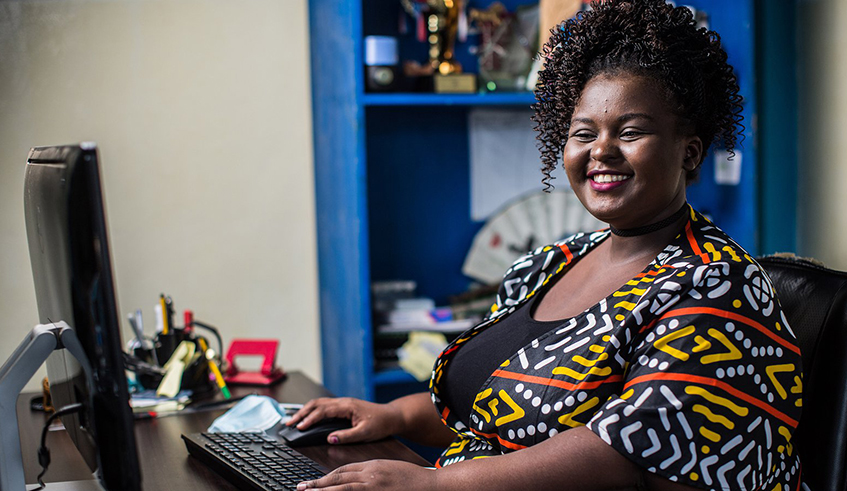

Before she started her company at the age of 20, Christelle Kwizera was troubled after reading articles about people being killed by crocodiles in eastern Rwanda. She read how women worried about their children every time they (the children) were sent to fetch water because there was a possibility that they would not return. And this is why she started her water project.
"I am a very passionate social activist. In particular, any issues related to the environment, youth or gender,” she says.
Kwizera, the founder and current managing director of Water Access Rwanda, an enterprise that aims at addressing water scarcity in Rwanda, especially in rural areas, recently scooped The Global Citizen Prize: Cisco Youth Leadership Award, which honours an individual aged 18-30 who has contributed meaningfully towards the goal of ending extreme poverty. The award includes a $250,000 prize paid to the organisation to which the individual contributes.
Covid-19 challenges
Like all sectors, her company was greatly affected by the pandemic, the biggest issue, she says, being disruption of their supply chain.
"We had major delays in shipping our different machinery products. Things that were supposed to reach Rwanda in March are arriving in December. Imagine spending that money, but you do not get what you expect until after eight months,” she says.
Christelle Kwizera,the founder of Water Access Rwanda. Photos: Courtesy
She adds that this was a major loss to the company because they had paid, but did not get the machinery that was supposed to keep the business running smoothly.
Another challenge she highlights is that their clients incurred great losses. "The incomes of our customers came to nothing or very little compared to the demands in the household. Those who had to go out and make money were obliged to stay at home to protect themselves and their families,” she says, adding, "We noticed a sharp drop in sales.”
As one of the solutions, she says, they started giving out water for free.
"We decided to give out water for free. That way, our clients would still be able to curb the spread of Covid-19 and maintain some basic needs, like access to clean water,” she adds.
"We made sure we kept taps open even though people couldn’t pay.”
The 27-year-old says that they have done their best to increase the access of water from kiosks to the homes of people, because during the tough times that Covid-19 brought, water was needed more than ever.
The initiative targets people in need of access to safe water. Photo: Net
"We also accelerated our plans to connect more people at home. So we provided more pipes and connected them from kiosks to people’s homes so as to decrease movement and vulnerability to Covid-19,” she explains.
According to Kwizera, the firm also experienced issues of cash flow but had partners who jumped in and helped them through it.
The former Lycee Notre Damme de Citeaux student also highlights that with the outbreak, she learnt a lesson— to avoid unnecessary debt.
Kwizera is of the view that women in general were mostly affected by the pandemic. "First, it increased domestic work. You know that during the lockdown everybody was staying home, so that means increased domestic work. People got sick and women were the ones taking on the burden,” she notes.
Moreover, the lockdown heavily affected entrepreneurs due to the lack of funding, leading to a higher risk of closing down. "Our struggle as a company was cash flow. I’ve seen other people close their businesses, lay off employees, or unable to provide their products.”
She says, "I am very thankful that we were okay as a company. Our commitment is very clear; water and people. So, when the crisis happened, there was no question if we were going to lay people off. Absolutely not. We don’t hire people just because they have experience, we hire them because they have the right spirit for the organisation. We train them to have the expertise for the position they applied for.”
The company that started with just five employees, now has 61 workers.
What the award means
Kwizera says that the award came as a testament to what they have been doing, and is a catalyst of the dreams they have. She plans to use the funding to repair and fill the gaps of Covid-19.
"I know our name is Water Access Rwanda but we’re probably going to rebrand to Water Access Africa, because we’ve always had a pan African vision. It doesn’t do anybody any good to sit on a good solution and not scale it. I want to create a solution that can spread like wildfire to meet the crisis in Africa because four hundred million need our solution right now across Africa.
"This award money wasn’t planned, so when it comes you get to check off so many needs, right? Now we’re reaching 70,000 people a day with clean water. So, if I get more money, that means I get to reach more people because our team is always ready to deploy. We have huge ambitions to impact over 30 million lives by 2030 and create 13, 000 permanent jobs through our interventions. We want to be in at least 12 countries.”
She says 2020 was the year to fail, cry and look at how unfair the world is, but on a positive note, 2021 is the year to take risks and develop skillsets.



